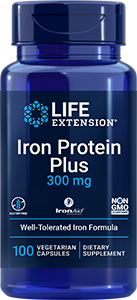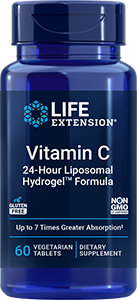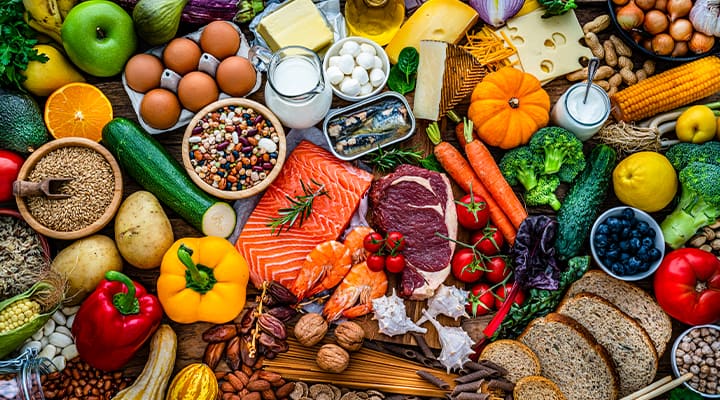
How to Take Iron Supplements: 8 Tips
Published: July 2023
Did you know that iron deficiency is the most common nutritional deficiency worldwide? In the United States, though, most people consume plenty of iron in their diets. However, iron needs change throughout the lifespan and certain groups are more susceptible to iron deficiency (pregnant women and vegetarians, we're talking about you!).
But knowing whether you need to supplement is key because an excess of iron has its own set of drawbacks. Here's how to find out if you do need iron supplementation—and if so, how to ensure you get the most from your iron.
What is iron?
Iron is an important mineral that plays a variety of roles—and one of the most important of those roles is helping oxygenate the body. Iron is present in hemoglobin, a protein found in red blood cells that carries oxygen from the lungs to the entire body. It is also present in myoglobin, another protein that supplies oxygen to muscles. Iron is necessary for physical growth, neurological development, cellular functioning, and even the synthesis of some hormones.
Who needs to supplement their iron intake?
Infants, toddlers, teenage girls, pregnant women, and premenopausal women are more likely to experience an iron deficiency.
Low iron may result from:
- Increased demand due to rapid growth
- Low iron intake due to dietary choices
- Decreased absorption due to a physiological reason
- Menstruation
That being said, not all of these groups should proactively supplement. Be sure to check with your healthcare provider to determine your needs and to determine your iron status. Iron has a "U"-shaped curve—meaning you don't want to get too little or too much.
What are iron supplements?
Supplemental iron as an oral dietary supplement is intended to help provide enough iron in a time of increased need. Iron supplements can be found in different forms, including ferrous sulfate (heptahydrate or monohydrate are the two types of ferrous sulfate available as supplements), ferrous gluconate, ferrous fumarate, and iron protein succinylate.
Of these, ferrous sulfate and ferrous gluconate forms are popular options for iron supplements and have their pros and cons—with ferrous gluconate being more absorbable but containing less elemental iron than the sulfate form. Studies suggest, however, that your best option for an effective iron supplement may be iron protein succinylate, a highly absorbable form of iron that is easier on the stomach than other forms of iron.
A 2020 review of 38 randomized clinical trials and 16 observational studies, with a total of 8,454 subjects, showed that iron protein succinylate raised hemoglobin and ferritin comparably or better than other forms of iron, and participants taking this form experienced the fewest adverse effects. Researchers concluded that iron protein succinylate is "an excellent choice for iron deficiency due to its superior effectiveness and tolerability."
The benefit of taking iron supplements is to ensure you have adequate iron levels, which is key to sustaining normal levels of energy and strength, not to mention overall wellbeing.
Should everyone take iron supplements?
No. Generally, someone who is not deficient in iron should not supplement with iron. This is why you often find iron-only formulas rather than iron-containing multivitamins—they simply aren't for everyone! The exception, of course, would be a comprehensive prenatal multivitamin (as iron needs are increased during pregnancy and lactation). Iron is necessary for growth and neurological development—this, and the increased plasma and red blood cell production, make iron extremely important during pregnancy and infancy.
Explore Our Best Women's Health Supplements
How to take iron supplements: 8 tips
If you do have low iron levels, let's talk about how to get the most from iron supplementation. Taking oral iron supplements isn't as straightforward as opening a bottle and swallowing a capsule, because different factors can influence how well you absorb the supplement as well as whether you experience side effects. Follow these tips to get the maximum benefits.
Choose a supplement made with iron protein succinylate.
As discussed above, this form of iron is more absorbable and less likely to cause any GI discomfort.Follow the label instructions carefully.
Be sure to refer to the bottle as specific instructions may vary from brand to brand. It is typically recommended to take iron supplements on an empty stomach for the best iron absorption.Snack strategically.
Some people can experience nausea when taking iron supplements without food. If this happens, you can eat a snack beforehand to help avoid this. (While it is better to take iron on an empty stomach, nausea might lead you to skipping iron supplementation altogether!)Listen to your doctor.
Follow your healthcare provider's instructions about how much supplemental iron to take and how long to take it. Follow-ups may be required every three to six months to check your iron status.Get enough vitamin C in your diet.
Iron is absorbed better when you get enough vitamin C in your diet, so be sure to regularly eat foods such as kiwi, citrus fruits, strawberries, broccoli, and bell peppers. You don't need to take a vitamin C supplement at the same time as you swallow your iron supplement, but taking a multivitamin with enough vitamin C or a standalone vitamin C tablet or capsule is a good idea.
Go easy on the fiber.
You'll want to avoid taking fiber supplements and eating foods with a lot of fiber within an hour or two before taking your iron supplement since it can reduce the absorption of iron. Occasional constipation could occur when taking iron supplements, though, so you do want to get plenty of fiber (from supplements and your diet) to help with regularity outside of the two-hour window of when you take your iron.Don't mix coffee and iron supplements.
You'll also want to avoid having caffeine and dairy products too close to when you take your iron supplements for this same reason.Be careful about beans.
Plant compounds like phytates which are found in beans can also lower iron absorption, which is part of the reason why plant sources of iron are poorly absorbed compared to animal sources (see heme vs. non-heme discussion below) for details. Beans do have many health benefits, but if you supplement because you're at risk for an iron deficiency, be cautious about how frequently you enjoy these legumes.
Can you get adequate iron from food?
Yes, and most people do. There are a variety of iron-rich foods, with the most abundant sources being meat and seafood. Most people can get plenty of iron from food if they eat a balanced diet. If you are trying to conceive, are pregnant, or breastfeeding, it is recommended to supplement your diet to ensure you are getting enough iron. Also, if you follow a plant-based vegan diet, then you may not be getting enough iron from food.
Do all vegetarians need iron supplements?
If you follow a vegan or vegetarian diet, iron deficiency should definitely be on your radar (and you'll want to stay current on your lab work so you'll know if your levels are low). That's because iron is present in two forms in the foods we eat, as heme iron and non-heme iron.
Heme iron is found predominantly in blood and muscle, which is why heme iron is primarily found in meat and other animal products. Non-heme iron is present in both plant and animal sources. Non-heme iron can be found in plant-based sources such as nuts, beans, vegetables, and iron-fortified grain products. In the United States, approximately half of the dietary iron intake is derived from bread, cereal, and other grain products.
Notably, these two forms differ in their absorption processes and bioavailability in the body. Heme iron is better absorbed and has a higher bioavailability, so a little bit of heme iron goes a long way! Up to 40% of heme iron from sources such as lean meat and seafood is absorbed by the body. On the other hand, the absorption of non-heme iron is lower, with approximately 10% or less of this form being absorbed.
References
- Georgieff, M.K., et al. "The Benefits and Risks of Iron Supplementation in Pregnancy and Childhood." Annu Rev Nutr. August 2019. https://www.ncbi.nlm.nih.gov/pmc/articles/PMC7173188/
- Martínez, F.A. and J.L. Martínez-Bujanda. "Efficacy and tolerability of oral iron protein succinylate: a systematic review of three decades of research." Curr Med Res Opin. April 2020. https://pubmed.ncbi.nlm.nih.gov/31944128/
- "Iron." Data on file.
Always be in the know!
Access the latest deals, wellness news, expert health tips & more!










